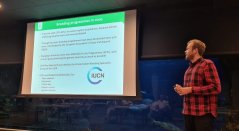
Nieuws
DNA research supports captive breeding programmes in zoos
Researchers from the Animal Breeding and Genomics group at Wageningen University & Research now join forces with studbook keepers from Rotterdam Zoo (Diergaarde Blijdorp) by performing DNA research to facilitate proper management of captive populations. In a recent kickoff meeting both institutions laid the foundation for future collaborative research.
Rotterdam Zoo coordinates the studbook of 5 endangered species: Asian elephants, tufted deer, red panda, Egyptian tortoise and Rüppels vulture. Utilizing DNA information will shed light on cryptic subspecies, family relatedness and inbreeding status of these captive populations.

For more than 300 zoo-housed species, breeding programmes have been established over the last decades with the intention to preserve genetic diversity as much as possible on a European level. Optimal management is needed to maintain a healthy population over the long term, and therefore detailed information about the (wild) background as well as relatedness of animals in the studbook is required. Such details are not always available and therefore DNA information can provide important insight into population structure to assist management.
Current management strategy aims to keep the mean kinship as low as possible and to preserve at least 90% of the gene diversity over 100 years from now. Another issue that studbook keepers face is ambiguity about subspecies in the zoological collections and sometimes even unresolved taxonomic issues in the wild complicate decisions for the captive population. First steps towards these goals are to establish sampling methods that will enable recovery of high-quality DNA for sequencing.